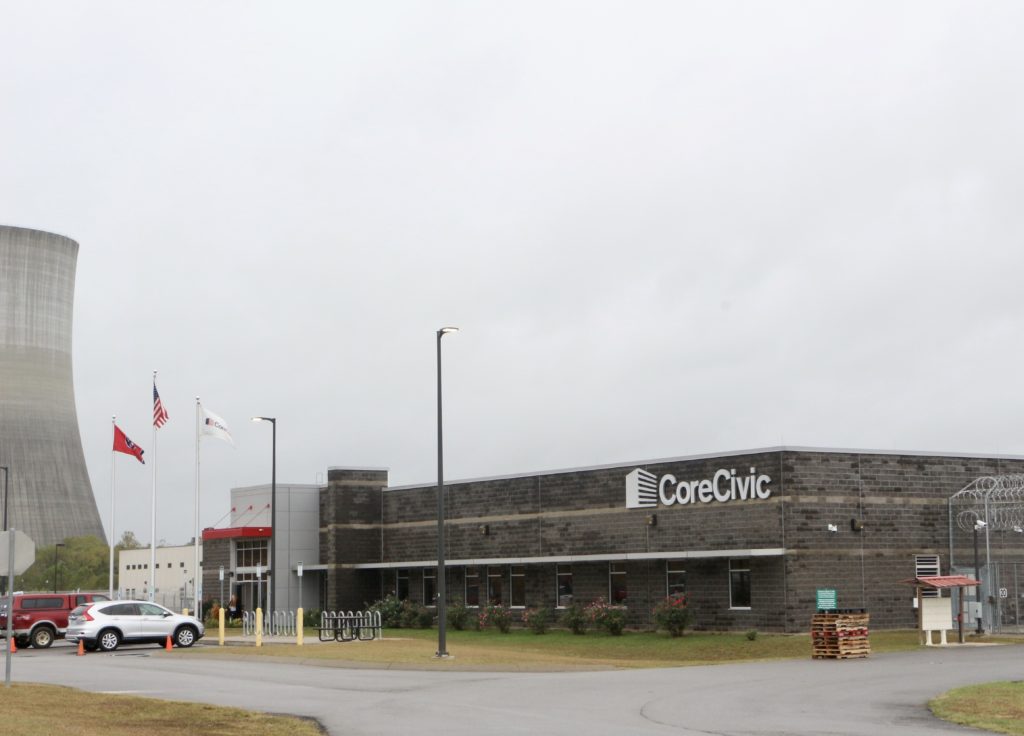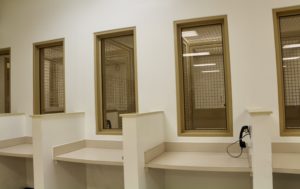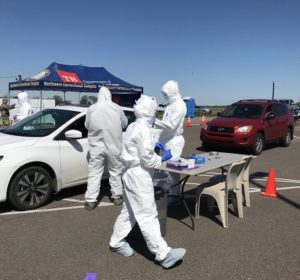
More than half of inmates at Tennessee’s largest prison have now tested positive for the coronavirus, in one of the biggest hotspots in the country.
But amid the testing and quarantining of inmates, those with loved ones behind bars say it’s been nearly impossible to get information.
Samantha Dixon’s boyfriend normally calls her every morning at 7:30 a.m. from the Trousdale Turner Correctional Center, where he’s serving a six-year sentence at the medium-security facility. But ever since the Tennessee National Guard tested all 2,444 inmates last week, Dixon hasn’t heard from him.
“We have no way of knowing what’s going on,” she said.
Dixon says he’s normally calm and keeps to himself, that he doesn’t want anything to get in the way of his parole hearing in February.
But when Dixon spoke to him on Friday, April 24, just days before mass testing began at the prison, something in his voice had changed. He sounded frantic.
“He was just like, ‘Hey, baby. I need you to do me a favor. I need you to be strong for me right now. I need you to — I need you to stay by my side,’ ” Dixon said, sniffling and clearing a lump in her throat between words. “He said, ‘It’s getting really bad in here.’ ”
Dixon is scared. She’s scared her boyfriend will get sick. She’s scared of whatever’s going on that’s kept him from calling.
“I don’t really know that they can protect him, to be honest with you. The only wish that I have is to somehow have contact with me,” Dixon said. “I just want to know that he’s OK.”
WPLN News heard from more than a dozen mothers, friends, sisters and significant others, expressing similar concerns. Many reached out, desperate for information even before the test results had been released.
 Samantha Max WPLN News
Samantha Max WPLN NewsThe phone booths in the visitors’ room at Trousdale Turner Correctional Center have set empty since Tennessee prisons stopped visitation to prevent the spread of COVID-19 in March.
“These boys are terrified. And us, as parents and wives and all this, we’re terrified for them. And there’s nothing we can do,” said one woman whose son has been incarcerated at Trousdale Turner for two years. She asked WPLN News not to publish her name, out of fear for her son’s safety.
Loved ones say their once-routine calls from the prison have become sporadic, as inmates were locked in their cells nearly 24 hours day to prevent the spread of the virus.
“He has the ability to call me every day,” said Rhonda Wright, whose son is also at Trousdale Turner. “When I don’t hear from him, then I, you know, wonder, is he sick?”
They were anxious to know if their loved ones had tested positive.
“He doesn’t know if he’s got it. We don’t know if he’s got it,” said Jennifer Reeves, whose brother is an inmate at the prison.
They wanted to know if they were getting the medications they needed or eating enough. If their loved ones were seeing the sunlight each day or breathing a bit of fresh air.
If they would make it out alive.
“I’m worried sick about it,” said Michelle Goff, also a sister of an inmate. “I’m scared to death that I’m not gonna watch my brother walk out of prison.”
Prison Outbreak Prompts Statewide Testing
CoreCivic, the Brentwood-based private corrections company that operates the prison, announced last Tuesday that it would test all inmates and staff at the prison after 93 prisoners and 12 employees tested positive for the coronavirus.
At that point, the Tennessee Department of Correction was taking a “tiered approach” to screening. First, inmates were tested if they reported symptoms or had been exposed to someone who was sick. Then, prisons would expand testing if there was a suspected outbreak.
Before last week, only one other prison — Bledsoe County Correctional Complex — had tested all of its prisoners. Nearly 600 of its approximately 2,300 inmates have tested positive.
Two correctional facilities have reported a few dozen cases of the coronavirus. Most others have only tested between one and five inmates.
But after mass testing at Trousdale Turner revealed 1,349 confirmed cases — 1,299 incarcerated individuals and 50 employees — Gov. Bill Lee announced Friday that every single inmate and prison staffer in the state would be tested for the virus, with help from the Tennessee National Guard and the Department of Health.
Thanks to Tennessee's increased capacity, we’re committed to testing all inmates & staff across the state in order to safeguard the health of these vulnerable individuals.
Read more in today's #COVID19 bulletin: https://t.co/SJJdXiQaHw pic.twitter.com/uYoMFqYl40
— Gov. Bill Lee (@GovBillLee) May 2, 2020
The announcement comes after officials refused for weeks to conduct widespread testing at its prisons, instead following the lead of other states in taking a targeted approach to inmate screening. Tennessee will be the first state in the U.S. to test everyone living and working in its prisons for COVID-19.
“Knowing the extent of the virus’s spread within our correctional facilities is critical, as incarcerated individuals remain one of the most vulnerable populations during this pandemic,” Lee said in a statement. “Thanks to our increased capacity, we’ll test all inmates and staff statewide in order to take appropriate actions to safeguard the health of these vulnerable individuals.”
‘It’s Like You’re At A Dead End’
Trousdale Turner is still on lockdown while people are being moved into quarantine, according to a spokesperson for CoreCivic. That’s limited inmates’ access to the phones.
The spokesperson said both the Department of Correction and prisoners’ emergency contacts would be notified in the case of hospitalizations and deaths. But she didn’t know if the prison would be sharing each individual’s COVID-19 status.
Karen Fisher, whose son was recently diagnosed with stomach cancer, says getting information about her son’s health was a struggle even before the pandemic, because of privacy laws. Now, she feels completely helpless.
“I feel lost. I feel cheated on my son’s life,” Fisher said, her voice breaking. “I just lift him in prayers. But, no, I think any parent deserves the right to have the information — or wife or husband — you know?”
 Courtesy of Tennessee Department of Correction via Twitter
Courtesy of Tennessee Department of Correction via TwitterThe Tennessee Guard assisted with drive-thru testing at the Northwest Correctional Complex and the Bledsoe County Correctional Complex, where hundreds of staff members were swabbed for COVID-19 in April.
The last time they spoke, Fisher’s son said he planned to stay in his cell as much as possible, to minimize his contact with others. He told her he’d call by the middle of the week. When the governor announced more than half of the prison had tested positive on Friday, Fisher still hadn’t heard from her son.
But the worry that started growing inside her was all too familiar. It’s the same panic that gives her migraines whenever the prison goes into lockdown.
“I’ve gone weeks without talking to him and — wooh, you talk about crazy. And concern and scared, because the devil will put thoughts in your head,” she said. “But I just place protection over him in the name of Jesus. You know, that’s all I can do.”
Jennifer Reeves says the unknown is what scares her most. Her brother has been in prison since 2013 and is supposed to be released in July. But she’s afraid he won’t survive that long.
“What’s running through my mind,” she says, is “are we gonna be able to lay our hands on our little brother and touch him and hug him and see him?”
Like many others with loved ones at the prison, Reeves has made more calls to the facility than she can count. She’s even sent letters to her mayor and the Board of Parole. She doesn’t know what else to do, besides sit by her phone, hoping it will ring.
“It’s like you’re at a dead end,” Reeves said. “You can’t go bust into the prison. You can’t go over there and demand things. So, you just sit and wait. You just pray and wait. That’s what I do. Pray and wait.”
Samantha Max is a Report for America corps member.

